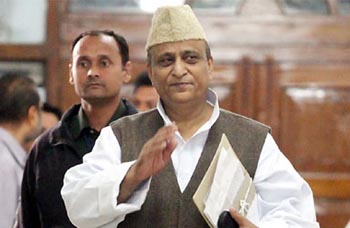 New Delhi, Apr 9: The Election Commission on Wednesday sought report from UP poll authorities on controversial remarks made by Azam Khan.
New Delhi, Apr 9: The Election Commission on Wednesday sought report from UP poll authorities on controversial remarks made by Azam Khan.
The controversial Samajwadi Party leader and UP minister Azam Khan on Wednesday took a defiant stand over his ‘Kargil remarks’ as he said that he has said nothing wrong and that his “statement on the Kargil should be welcomed”.
Talking to the reporters, Khan said: “What is the harm in talking about the contributions of Muslims for the country…why can’t we talk about it? Why are the sacrifices of Muslim soldiers being ignored? What is so wrong about it? My statement on Kargil should be welcomed.”
Meanwhile, the Bharatiya Janata Party will be meeting the Chief Election Commissioner to complain against the SP leader and seek action against him.
Khan has courted controversy as he dragged the Kargil conflict into the ongoing high voltage Lok Sabha campaign, saying it was “Muslim soldiers” who fought for India’s victory in the 1999 Kargil war against Pakistan.
Earlier in the day, the Election Commission sought details on the speech of Azam Khan over his ‘Kargil’ remarks. The Congress has already complained to the poll panel against Khan over his controversial remarks.
In a speech laced with communal overtones during an election rally in Ghaziabad on Tuesday night, Khan had said: “Those who fought for victory in Kargil were not Hindu soldiers, in fact the ones who fought for our victory were Muslim soldiers.”
Khan also went on to say that no one can guard the country’s borders better than those from the Muslim community. “Recruit us in the Indian Army. No one can guard the borders of our nation better than us,” he said.
Khan’s remarks comes at a time when he is already under fire for calling BJP general secretary Amit Shah a ‘goonda’ (thug) and ‘qatil’ (killer) and describing Narendra Modi as an ‘enemy of the Muslims’
Former Army Chief and BJP’s candidate in Ghaziabad Gen V K Singh condemned Khan’s remarks, saying the Kargil war was “won by Indians”. Singh is looking to capitalise on the significant population of ex-servicemen in the area.
Congress spokesman Randeep Surjewala said action should be taken against Khan for “intemperate” remarks that could lead to division of communities based on regligion or caste.






Comments
Add new comment